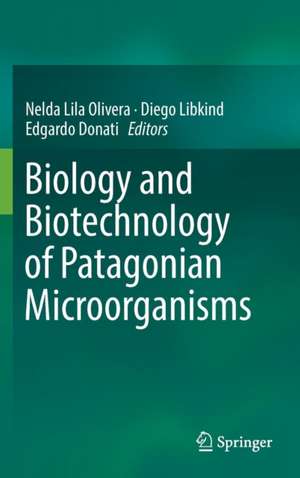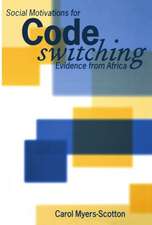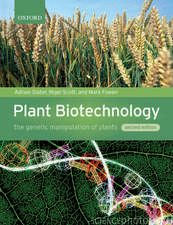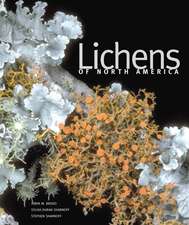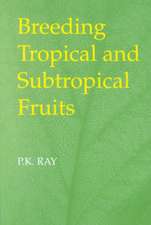Biology and Biotechnology of Patagonian Microorganisms
Editat de Nelda Lila Olivera, Diego Libkind, Edgardo Donatien Limba Engleză Hardback – 16 dec 2016
| Toate formatele și edițiile | Preț | Express |
|---|---|---|
| Paperback (1) | 948.47 lei 6-8 săpt. | |
| Springer International Publishing – 11 iul 2018 | 948.47 lei 6-8 săpt. | |
| Hardback (1) | 954.62 lei 6-8 săpt. | |
| Springer International Publishing – 16 dec 2016 | 954.62 lei 6-8 săpt. |
Preț: 954.62 lei
Preț vechi: 1164.17 lei
-18% Nou
Puncte Express: 1432
Preț estimativ în valută:
182.69€ • 190.03$ • 150.82£
182.69€ • 190.03$ • 150.82£
Carte tipărită la comandă
Livrare economică 14-28 aprilie
Preluare comenzi: 021 569.72.76
Specificații
ISBN-13: 9783319427997
ISBN-10: 3319427997
Pagini: 416
Ilustrații: XVII, 360 p. 73 illus., 37 illus. in color.
Dimensiuni: 155 x 235 x 22 mm
Greutate: 0.71 kg
Ediția:1st ed. 2016
Editura: Springer International Publishing
Colecția Springer
Locul publicării:Cham, Switzerland
ISBN-10: 3319427997
Pagini: 416
Ilustrații: XVII, 360 p. 73 illus., 37 illus. in color.
Dimensiuni: 155 x 235 x 22 mm
Greutate: 0.71 kg
Ediția:1st ed. 2016
Editura: Springer International Publishing
Colecția Springer
Locul publicării:Cham, Switzerland
Cuprins
Introduction.- Part I Environmental Microbial Biotechnology.- Chapter 1 Molecular biological tools for the assessment of hydrocarbon-degrading potential in coastal environments.- Chapter 2 Indigenous PAH-degrading bacteria in oil-polluted marine sediments from Patagonia. Diversity and biotechnological properties.- Chapter 3 Hydrocarbon remediation by Patagonian microbial consortia.- Chapter 4 Assessment of microbial Patagonian communities for using in heavy metal bioremediation.- Chapter 5 Microbiological and biochemical indicators for assessing soil quality in drylands from Patagonia.- Part II Patagonian Microorganisms for Industrial and Sanitary Applications.- Chapter 6 Molecular ecology of class 1 integrons in Patagonia as model system for understanding the rise of antibiotic resistance isolates around the world.- Chapter 7 Novel sources of antimicrobials from pristine and poorly explored environments. The Patagonia microbiota case.- Chapter 8 Bioprospecting for bioactive actinomycetes from Patagonia.- Chapter 9 Microorganisms from Patagonia and Antarctica and their cold-active skills for using polymeric materials.- Chapter 10 Alkaline proteases from Patagonian bacteria.- Chapter 11Extremophilic Patagonian microorganisms working in biomining.- Chapter 12 Microorganisms from Patagonian aquatic environments for use in aquaculture.- Chapter 13 Indigenous lactic acid bacteria communities associated with spontaneous malolactic fermentations in Patagonian wines: Basic and applied aspects.- Part III Yeast Biotechnology.- Chapter 14 Saccharomyces in traditional and industrial fermentations from Patagonia.- Chapter 15 Wild yeasts selection for high quality Patagonian wines.- Chapter 16 Patagonian antagonist yeasts for food biopreservation.- Chapter 17 Biotechnologically relevant yeasts from Patagonian natural environments.
Notă biografică
Nelda Olivera is a researcher from the CONICET of Argentina. She achieved both MSc and PhD degrees in Biology from Universidad Nacional del Sur, Argentina. For the last 20 years, she has been focusing her research on the biotechnological potential of microorganisms from the Argentine Patagonian region. Her research topics included microbiological soil quality indicators, hydrocarbon pollution bioremediation, enzyme and biosurfactant production and aquaculture probiotics.
Diego Libkind is a researcher from the CONICET since 2007. He achieved Licenciate degree in Biology in Universidad Nacional del Comahue and PhD degree in Biochemistry from Universidad Nacional de Tucumán. For the last 15 years, he has been focusing his research in the biodiversity and biotechnological potential of yeasts from natural environments of the Andean Argentine Patagonian. In the recent years he has focused mainly in extreme environments such as mountain lakes, high altitude phyllosphere, glaciers and volc10 already described), bioprospection of industrially relevant secondary metabolites (ex. UV protectants, antioxidants, etc) and assessment of biotechnologically interesting applications of native yeasts (brewing, probiotics, bioremediation).
Edgardo Donati is a full professor at National University of La Plata, principal researcher from CONICET, and the head of CINDEFI. He has a PhD in Chemistry from National University of La Plata. Areas of expertise are biomining, bioremediation, prokaryotic extremophiles in geothermal and mining zones. He has published more than 90 papers in biotechnology, 40 papers in science education, 6 books, and more than 25 chapters in different books. He has been supervisor of several PhD, master, and degree thesis.
Diego Libkind is a researcher from the CONICET since 2007. He achieved Licenciate degree in Biology in Universidad Nacional del Comahue and PhD degree in Biochemistry from Universidad Nacional de Tucumán. For the last 15 years, he has been focusing his research in the biodiversity and biotechnological potential of yeasts from natural environments of the Andean Argentine Patagonian. In the recent years he has focused mainly in extreme environments such as mountain lakes, high altitude phyllosphere, glaciers and volc10 already described), bioprospection of industrially relevant secondary metabolites (ex. UV protectants, antioxidants, etc) and assessment of biotechnologically interesting applications of native yeasts (brewing, probiotics, bioremediation).
Edgardo Donati is a full professor at National University of La Plata, principal researcher from CONICET, and the head of CINDEFI. He has a PhD in Chemistry from National University of La Plata. Areas of expertise are biomining, bioremediation, prokaryotic extremophiles in geothermal and mining zones. He has published more than 90 papers in biotechnology, 40 papers in science education, 6 books, and more than 25 chapters in different books. He has been supervisor of several PhD, master, and degree thesis.
Textul de pe ultima copertă
The Argentinean Patagonia offers a great diversity of scarcely explored environments suitable for the bioprospection of biotechnological relevant microorganisms. This book provides readers with a concise and clearly illustrated treatment of outstanding topics of Patagonian microbiology and biotechnology. It covers a wide range of areas interesting to several audiences such as researchers, graduate students and professionals working on the industry food. Among the main topics we will discuss examples of environmental applications, such as heavy metal and hydrocarbon bioremediation, bioprospection of valuable molecules from extremophilic bacteria and yeasts, the use of Patagonian yeasts and lactic acid bacteria in fermented foods and beverages, aquaculture probiotics and yeasts for food biopreservation.
Caracteristici
This is the first book about microorganisms from Patagonia The book has a wide coverage of topics interesting for a large audience of researchers, undergraduate and graduate students as well as food industry professionals. This region has several diverse and unexplored environments suitable for bioprospection of biotechnological-relevant microorganisms Includes supplementary material: sn.pub/extras
